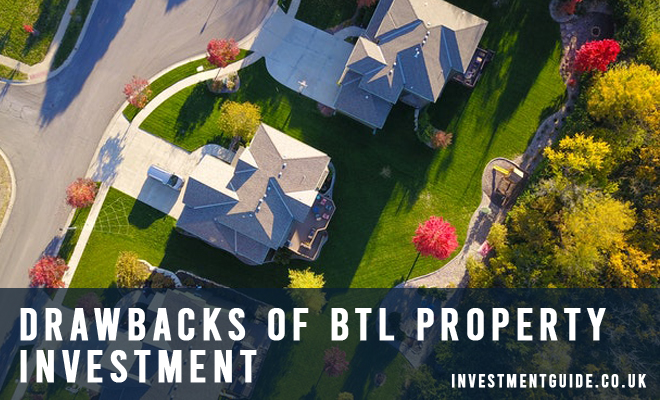Every investment class has its pros and cons and property is no different.
Some of the key advantages of investing in property include the potential for both income and capital appreciation and readily available financing to leverage your capital and boost potential returns. However, it’s not all sunshine and rainbows and this article will look to consider why you might not want to invest in property.
High upfront investment
Buy-to-let mortgages typically require a minimum 25% deposit. Depending upon where you are trying to purchase, the required deposit will vary. For a £300,000 property, you will need £75,000 plus cash for various fees associated with purchase (stamp duty, legal fees, surveys, auction premium if applicable).
This initial cost puts many would-be property investors off. It often also leads to an ‘all eggs in one basket’ investment approach which increases risk. For example, if you rely on a buy-to-let property for retirement income and your tenant loses his/her job and stops paying rent. Risk is not isolated to income, the capital value of the property could also decrease leaving you with negative equity. For example, many flats in London in prime office locations would have lost value following the COVID-19 pandemic due to an expectation that home working will continue to rise in popularity.
Ongoing costs
As well a high upfront investment cost, there are ongoing costs associated with buy-to-let property which must be factored into any profitability calculations.
For example, the cost of:
- Void periods where your property is not let to tenants but you still have to pay the mortgage and incur ongoing costs
- Landlords insurance
- Periodic testing costs (see buy-to-let landlord requirements)
- Buy-to-let interest rates which are higher than traditional residential mortgages
- Letting agent/management agent fees if you don’t want to find tenants or deal with maintenance issues yourself
- Property maintenance
Hidden problems and surprise bills
It is always advised to get a building survey prior to purchase as structural problems may not be clearly visible to the untrained eye.
Unfortunately, getting a building survey doesn’t guarantee that you will suffer no surprise problems later on down the line though. Having a buy-to-let property is no different to having your own property. The boiler might break, the roof might leak, or you may end up with a damp problem due to tenants not opening windows.
It is important to manage your risks. For example, finding tenants who will be responsible and take care of your property rather than adding to the level of risk.
Illiquid asset
Whereas if you own shares, you can sell your holdings at a click of a button, property sales/purchases can take weeks or months to be agreed, and typically even longer to close due to the involvement of solicitors, surveyors, and local councils to provide search results. If ready access to cash is required, the property game is probably not right for you.
UK tax environment
The Government has reduced tax incentives a number of times in recent years. For example, removing the ability to offset mortgage interest against profits (which could feasibly result in landlords paying tax on non existent profits) and increasing stamp duty for the purchase of second homes.
Whilst it’s impossible to predict how the Government may change tax rules in the future, the current trend suggests that it may continue to implement stricter rules.
Risk of bad tenants
The importance of finding the right tenants who will take care of your property cannot be underestimated.
A bad tenant might pay rent late or not at all, cause damage to property, receive complaints from neighbours or the council, or perhaps may just be unpleasant to deal with.
There are steps you can take to limit your risk, such as meeting prospective tenants personally and asking for a deposit. However, sometimes problems can arise which you didn’t expect.
Not only can this have a negative cash flow effect, it can also be emotionally draining and stressful. Other investments feature the potential for stress (e.g. experiencing the highs and lows of the stock market) but perhaps none equivalent to having to personally deal with a bad tenant.
Rising interest rates
At the moment, interest rates are fairly low and house prices remain high in the UK. This means that a typical buy-to-let investor will borrow a significant sum of money to facilitare his/her purchase.
A 1.0% interest rate rise on a £225k interest only mortgage taken out on a £300k property (75% LTV) would result in additional annual costs of £2,250. As mentioned earlier, these interest costs can no longer be offset against profits which could feasibly result in landlords paying tax on non existent profits if rent charges cannot be increased to offset the increased interest charges.
Conclusion
Property can be a fantastic investment and has generated significant wealth for many UK-based investors. However, with house prices continuing to rise, the cash requirements to invest are substantial and ongoing costs and landlord responsibilites should not be forgotten.
If you want exposure to the property market but without the direct involvement in managing a residential buy-to-let property investment yourself, there are a number of other options available. As one example, you could invest in a Real Estate Investment Trust (‘REIT’) through an established fund platform. You could also cross refer to our article on investing in property without owning it yourself.


